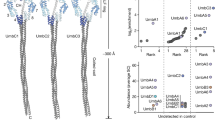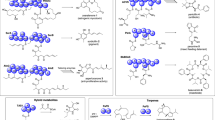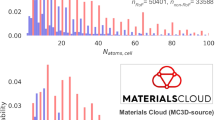Abstract
THE mould Trichoderma viride Pers. ex Fries is generally known to possess marked powers of antagonism to other fungi. It has been previously shown1 that some strains of this mould produce gliotoxin. We have recently found a number of strains which produce another substance, which we propose to name 'viridin', characterized by remarkably high fungistatic activity.
This is a preview of subscription content, access via your institution
Access options
Subscribe to this journal
Receive 51 print issues and online access
$199.00 per year
only $3.90 per issue
Buy this article
- Purchase on Springer Link
- Instant access to full article PDF
Prices may be subject to local taxes which are calculated during checkout
Similar content being viewed by others
References
Brian, P. W., Nature, 164, 667 (1944).
Weindling, R., and Emerson, O. H., Phytopath., 26, 1068 (1936).
Author information
Authors and Affiliations
Rights and permissions
About this article
Cite this article
BRIAN, P., MCGOWAN, J. Viridin: a Highly Fungistatic Substance Produced by Trichoderma viride. Nature 156, 144–145 (1945). https://doi.org/10.1038/156144a0
Issue Date:
DOI: https://doi.org/10.1038/156144a0
This article is cited by
-
Trichoderma: a Beneficial Antimycotic Agent and Insights on Its Utilization in Nanoparticle Synthesis
BioNanoScience (2023)
-
Biosynthetic pathway for furanosteroid demethoxyviridin and identification of an unusual pregnane side-chain cleavage
Nature Communications (2018)
-
Inhibition of Phytophthora species, agents of cocoa black pod disease, by secondary metabolites of Trichoderma species
Environmental Science and Pollution Research (2018)
Comments
By submitting a comment you agree to abide by our Terms and Community Guidelines. If you find something abusive or that does not comply with our terms or guidelines please flag it as inappropriate.



